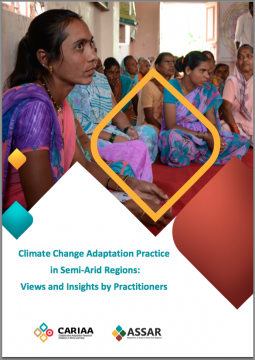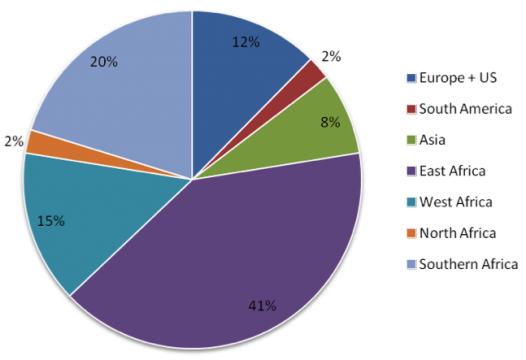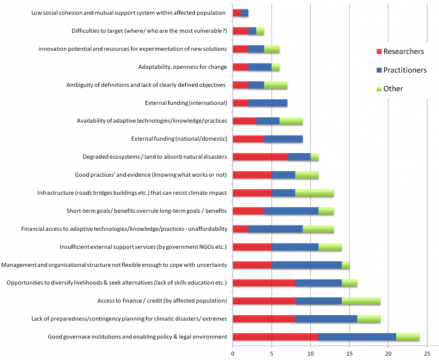Report based on survey: Climate Change Adaptation Practice in Semi-Arid Regions – Views and Insights by Practitioners


Scope and Methodology
The Research into Use (RiU) element of the research project Adaptation at Scale in Semi- Arid Regions (ASSAR) aims to ensure that ASSAR’s research outputs and findings are taken-up in adaptation practice and policy spheres across semi-arid regions. For that purpose, the ASSAR consortia is keen to engage with practitioners early in the research process to reflect their views in the research design and in the definition of research questions. It is recognised that this step is key to enhance the likelihood of research up- take and creates interest and ownership in the research process by practitioners.
In order to solicit views and insights by climate change adaptation practitioners, Oxfam GB, one of ASSAR’s consortia lead partners, collaborated with weADAPT to devise a short online survey. The results of this survey have been analysed and synthesised in a report. If you are interested in reading more about practitioner perspectives on information gaps and needs for adaptation in practice, please see the link provided below.”
The survey findings have been analysed by taking into account the professional sector/ type of organisation and institution the respondents indicated. For this purpose, the findings have been divided into three categories: (1) total = all respondents; (2) practitioners and (3) researchers. This has been done to explore whether there is significant difference in information needs, information sources and perceived barriers to implementation between practitioners and researchers.
Strong efforts were made to target climate change adaptation (CCA) practitioners working specifically in semi-arid regions in order to maximise relevance to ASSAR’s research agenda.
This report elaborates recommendations aimed at ASSAR’s Regional Research Teams (RRT) as they enter the transition between the Regional Diagnostic Studies (RDS) and the Regional Research Programmes(RRP), and as such, recommendations hope to influence the design and refining of research questions. The Oxfam team is committed to supporting the RRTs in this transition process by offering them tailored support.

Figure 1 from report (p.8): Geographical distribution of respondents
Extract of some key recommendations (see full report for further findings)
- Lack of good, participatory governance, institutions and an enabling environment is identified overwhelmingly as the main barrier to implementing an adaptation agenda (in a separate category, rigidity of institutions to cope with uncertainty ranks as an important barrier, too). Research programmes should, therefore, ensure they understand the nuances of power dynamics at country and regional levels to overcome governance shortcomings and inequalities. Research programmes should, likewise, ensure that research questions recognise these shortcomings as main barriers to adaptation, and hence these issues are researched, analysed and addressed as necessary as part of ASSAR’s aim to bring change to adaptation policy and practice.
- Designing, planning, M&E and implementation of adaptation measures is considered by all actors to be difficult (when asked whether they are easy or difficult). This could suggest that there is significant experimentation and trial & error practice ongoing, as well as considerable learning potential, in the adaptation ‘world’. This finding will demand from us that we recognise the need and exploit the freedom to be innovative, but also to pay special attention to collecting lessons from the processes implemented during the research – and analyse what has and has not worked and why.
- Further inquiry should be done to understand what kind of climate information adaptation practitioners need and use (and how they use it) in order to improve adaptation practice in semi-arid regions, particularly in view of the low quality and quantity of climate data in semi-arid regions. Also, though climate information is in most demand and accessible, further research is needed into how easy it is to use and apply, as well as how appropriately it is being analysed and introduced in strategies/ policies. There is the risk of incorrect interpretation and this is perhaps why there is increasing emphasis on ‘climate services’ in the adaptation arena.
- With respect to the more explicit inclusion of gender into regional programmes/ questions to inform ASSAR research, we should consider exploring the existing barriers to women’s participation and the potential women have on implementing actions and achieving adaptation in semi-arid regions. This exploration will also entail ensuring there is recognition of women’s input and potential in achieving adaptation goals (e.g. agricultural production, NRM, driving political agendas) and to explore the gender subject considerably beyond the availability of gender-differentiated data. Let us keep in mind that more than half of respondents consider gender differentiated data at best ‘somewhat useful’ (1 in 5 think it is not relevant/not useful), which indicates low awareness of stakeholders on the contribution women (can) make to CCA and, therefore, demands our inclusion of gender-related research questions to capture a larger scope of CCA objectives.
- Strong multi-disciplinary approaches and skill sets, composition of planning and implementation teams are already required to unleash the potential of multi- disciplinary information. This aspect should be recognised and ideally addressed by research questions and communication of their findings, and furthermore it highlights the importance of ASSAR’s component of building capacity of policy- makers, decision-makers and researchers to maximise research uptake.

Figure 8 from report (p.15): Responses to the survey question 6: What are the main obstacles to implementing adaptation actions in your country or region?; Total of 48 respondents (Click to enlarge)
(0) Comments
There is no content